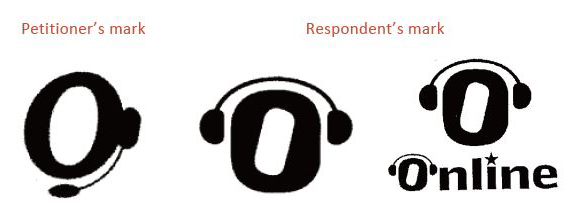
Preliminary Injunction
in Trademark Dispute Revisited

Foreign language training has always been a profitable business in Taiwan. While Taiwan’s sole official language is Mandarin Chinese, mastery of at least one foreign language is essential to the success of Taiwanese who intend to explore greater opportunities abroad, with English being the language of the most favorable choice.
TutorABC and KOJEN are two major English training services. They have been engaging in direct competition and legal disputes for years. TutorABC claims to be the first institution invests in online interactive distance English learning who owns a series of registrations for a “zero” device having a single-sided headset with microphone attached. This stands in contrast to KOJEN, which registered for a series of marks of “zero” device having instead a headphone but no microphone. During business operation, KOJEN also developed its online learning courses and used the trademarks in dispute on webpages and social media. Since the two companies engaged in direct competition, about seven years ago TutorABC filed trademark infringement lawsuit against KOJEN and won in the first instance. Pending litigation for second instance before the IP court, TutorABC moved for preliminary injunction seeking to stop KOJEN from continued use of the trademarks in dispute.
Pursuant to Article 22(2) of the Intellectual Property Case Adjudication Act, “… seeking an injunction maintaining the temporary status quo shall provide a preliminary showing proving it is necessary to prevent material harm or imminent danger or other similar circumstances with regard to the legal relation in dispute. The court shall dismiss the application if the preliminary showing is insufficient.” In other words, to necessarily prevent the material harm or imminent danger or other similar circumstances with regards to the legal relation in dispute, a party of interest may petition for preliminary injunction. The legal terms of “material harm” and “imminent danger” are, however, indefinite and ambiguous, suggesting that a court is reserved with discretion to apply a substantive definition depending on facts of each specific case and the balance of interests. The court stressed that only when the Petitioner’s interest that can be secured or injuries that can possibly be avoided is greater than the Respondent’s disadvantage or injuries that may be incurred, will an injunction be necessary and justifiable.
Reviewing evidence and arguments from both parties, the IP Court ruled in favor of the Petitioner, granting the Petitioner injunctive relief.
The court held that the protectable subject of the Trademark Act is not a trademark itself but rather the “goodwill” that is gained through long-term use and advertising activities. The trademark owner suffers harm when there is a possibility that the functions of distinctiveness, representation of origin, quality assurance and advertisement are destroyed or likely to be destroyed, or that there is a danger that the consumers’ judgement could be compromised, or that the use of an infringing mark will affect the consumer’s recognition and association towards the goodwill of the mark (namely “likelihood of confusion”). As such, the brand’s associated value and business goodwill, which are valuable characters accumulated through the investments of time and money, will likely be depreciated or diminished. These are types of intangible harm suffered by the Petitioner.
The second instance IP Court further analyzed whether the Petitioner faced imminent danger in the present legal dispute. Based on various pieces of evidence, the Court believed that the Respondent had been using and was highly likely to continue using the trademarks in dispute. As such, the Petitioner’s trademark faces the imminent danger that it will be continuously infringed.
With respect to the balance of interest, the Court held that the granting of a preliminary injunction would not cause any harm to the Respondent on account of the Respondent still being able to use other word marks bearing the name “KOJEN” for its business operations. Most critically, the court set forth the nature of an injunction that, as an equitable relief, the grant of which is solely to prevent a non-quantifiable harm such as “confusion”. However, once there occurs confusion in the consumers, it could deeply root in consumer’s mind and undermine their decision-making ability when choosing the authentic source of intended product, which is supposedly the core, or perhaps sole, function of a given mark.
Firmly based on the above analysis, the IP Court granted the injunction, which was subsequently appealed to the Supreme Court by the unsatisfied KOJEN. On April 18, the Supreme Court dismissed that interim appeal.
The Supreme Court summarized a test used for determining whether or not to grant a preliminary injunction. The test, which largely corresponds to the IP Court’s reasoning, entails that the following requirements be met:
- The Petitioner has likelihood of prevalence in the pending suit;
- Continued use of infringing mark presents an imminent danger;
- The use of the mark in dispute negatively impacts the Petitioner’s competitive advantage in commerce accumulated throughout time founded on fiscal investments and advertisement efforts;
- The use depreciates the Petitioner brand’s good will, business values, and trademark distinctiveness;
- The use results in grave and irreparable injury to the Petitioner that is not recoverable by monetary damage; and that
- The injunction will not undesirably cause severe injuries to the Respondent.
The Supreme Court opined that IP Court’s application of laws and fact finding were not made in error. The grant of injunction was proper and correct according to the aforementioned test. The IP Court’s ruling was affirmed. The clear analysis of the requirements set forth under the test by both courts may benefit trademark owners involved in infringement suits as it can serve trademark owners a better prediction of whether or not a preliminary injunction will be granted.
for any questions relating to this topic, please contact us at cjchen@tsailee.com.tw |